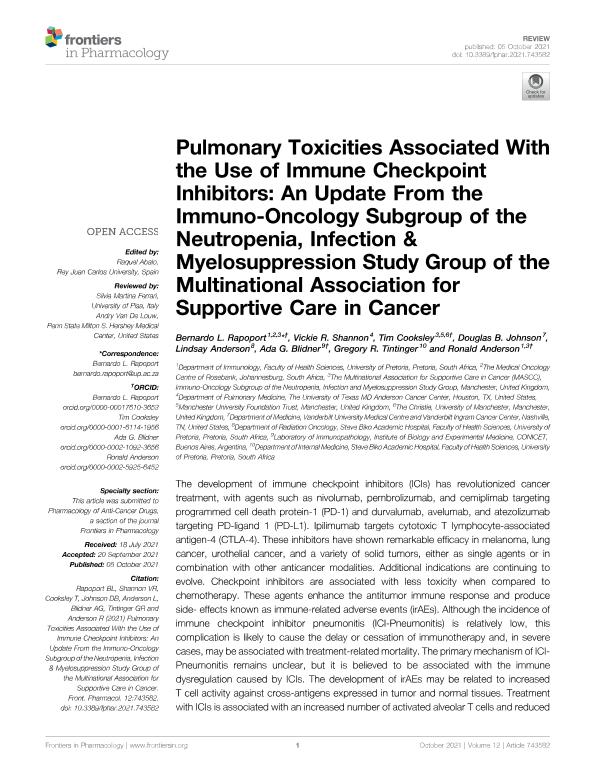Mostrar el registro sencillo del ítem
dc.contributor.author
Rapoport, Bernardo L.
dc.contributor.author
Shannon, Vickie R.
dc.contributor.author
Cooksley, Tim
dc.contributor.author
Johnson, Douglas B.
dc.contributor.author
Anderson, Lindsay
dc.contributor.author
Blidner, Ada Gabriela

dc.contributor.author
Tintinger, Gregory R.
dc.contributor.author
Anderson, Ronald
dc.date.available
2022-07-26T17:31:58Z
dc.date.issued
2021-10-05
dc.identifier.citation
Rapoport, Bernardo L.; Shannon, Vickie R.; Cooksley, Tim; Johnson, Douglas B.; Anderson, Lindsay; et al.; Pulmonary toxicities associated with the use of immune checkpoint inhibitors: an update from the immuno-oncology subgroup of the neutropenia, infection & myelosuppression Study Group of the Multinational Association for Supportive Care in Cancer; Frontiers Media; Frontiers in Pharmacology; 12; 743582; 5-10-2021; 1-17
dc.identifier.issn
1663-9812
dc.identifier.uri
http://hdl.handle.net/11336/163188
dc.description.abstract
The development of immune checkpoint inhibitors (ICIs) has revolutionized cancer treatment, with agents such as nivolumab, pembrolizumab, and cemiplimab targeting programmed cell death protein-1 (PD-1) and durvalumab, avelumab, and atezolizumab targeting PD-ligand 1 (PD-L1). Ipilimumab targets cytotoxic T lymphocyte-associated antigen-4 (CTLA-4). These inhibitors have shown remarkable efficacy in melanoma, lung cancer, urothelial cancer, and a variety of solid tumors, either as single agents or in combination with other anticancer modalities. Additional indications are continuing to evolve. Checkpoint inhibitors are associated with less toxicity when compared to chemotherapy. These agents enhance the antitumor immune response and produce side- effects known as immune-related adverse events (irAEs). Although the incidence of immune checkpoint inhibitor pneumonitis (ICI-Pneumonitis) is relatively low, this complication is likely to cause the delay or cessation of immunotherapy and, in severe cases, may be associated with treatment-related mortality. The primary mechanism of ICI-Pneumonitis remains unclear, but it is believed to be associated with the immune dysregulation caused by ICIs. The development of irAEs may be related to increased T cell activity against cross-antigens expressed in tumor and normal tissues. Treatment with ICIs is associated with an increased number of activated alveolar T cells and reduced activity of the anti-inflammatory Treg phenotype, leading to dysregulation of T cell activity. This review discusses the pathogenesis of alveolar pneumonitis and the incidence, diagnosis, and clinical management of pulmonary toxicity, as well as the pulmonary complications of ICIs, either as monotherapy or in combination with other anticancer modalities, such as thoracic radiotherapy.
dc.format
application/pdf
dc.language.iso
eng
dc.publisher
Frontiers Media

dc.rights
info:eu-repo/semantics/openAccess
dc.rights.uri
https://creativecommons.org/licenses/by-nc-sa/2.5/ar/
dc.subject
ANTI-CTLA-4 ANTIBODIES
dc.subject
ANTI-PDL-1 MONOCLONAL ANTIBODIES
dc.subject
IMMUNE CHECKPOINT INHIBITORS
dc.subject
IMMUNE RELATED ADVERSE EFFECTS
dc.subject
PNEUMONITIS
dc.subject.classification
Oncología

dc.subject.classification
Medicina Clínica

dc.subject.classification
CIENCIAS MÉDICAS Y DE LA SALUD

dc.subject.classification
Inmunología

dc.subject.classification
Medicina Básica

dc.subject.classification
CIENCIAS MÉDICAS Y DE LA SALUD

dc.title
Pulmonary toxicities associated with the use of immune checkpoint inhibitors: an update from the immuno-oncology subgroup of the neutropenia, infection & myelosuppression Study Group of the Multinational Association for Supportive Care in Cancer
dc.type
info:eu-repo/semantics/article
dc.type
info:ar-repo/semantics/artículo
dc.type
info:eu-repo/semantics/publishedVersion
dc.date.updated
2022-07-04T20:15:31Z
dc.journal.volume
12
dc.journal.number
743582
dc.journal.pagination
1-17
dc.journal.pais
Suiza

dc.journal.ciudad
Lausanne
dc.description.fil
Fil: Rapoport, Bernardo L.. University of Pretoria. Faculty of Health Sciences; Sudáfrica. Multinational Association of Supportive Care in Cancer. Immuno Oncology Subgroup of the Neutropenia, Infection and Myelosuppresion Study Group; Reino Unido. The Medical Oncology Centre of Rosebank; Sudáfrica
dc.description.fil
Fil: Shannon, Vickie R.. University of Texas; Estados Unidos
dc.description.fil
Fil: Cooksley, Tim. Multinational Association of Supportive Care in Cancer. Immuno Oncology Subgroup of the Neutropenia, Infection and Myelosuppresion Study Group; Reino Unido. University of Manchester; Reino Unido
dc.description.fil
Fil: Johnson, Douglas B.. Vanderbilt University; Estados Unidos
dc.description.fil
Fil: Anderson, Lindsay. University of Pretoria. Faculty of Health Sciences; Sudáfrica
dc.description.fil
Fil: Blidner, Ada Gabriela. Consejo Nacional de Investigaciones Científicas y Técnicas. Instituto de Biología y Medicina Experimental. Fundación de Instituto de Biología y Medicina Experimental. Instituto de Biología y Medicina Experimental; Argentina
dc.description.fil
Fil: Tintinger, Gregory R.. University of Pretoria. Faculty of Health Sciences; Sudáfrica
dc.description.fil
Fil: Anderson, Ronald. Multinational Association of Supportive Care in Cancer. Immuno Oncology Subgroup of the Neutropenia, Infection and Myelosuppresion Study Group; Reino Unido. University of Pretoria. Faculty of Health Sciences; Sudáfrica
dc.journal.title
Frontiers in Pharmacology
dc.relation.alternativeid
info:eu-repo/semantics/altIdentifier/url/https://www.frontiersin.org/articles/10.3389/fphar.2021.743582/full
dc.relation.alternativeid
info:eu-repo/semantics/altIdentifier/doi/http://dx.doi.org/10.3389/fphar.2021.743582
Archivos asociados
